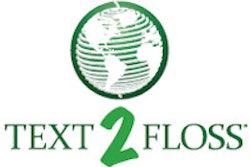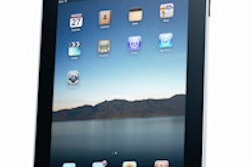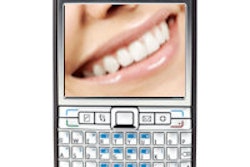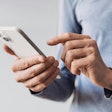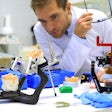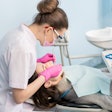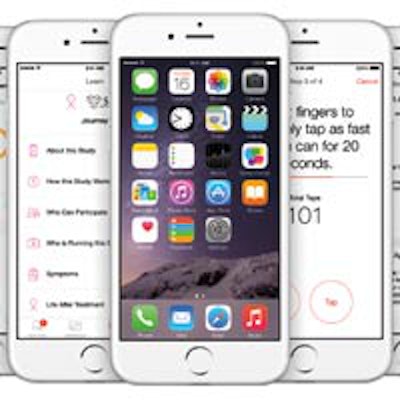
Apple introduced ResearchKit, an open-source software framework designed to benefit medical researchers, at its March 2015 Special Event on Monday. Using ResearchKit, researchers will be able to more easily design apps that allow patients to remotely consent to join clinical trials and provide data.
"Some researchers see patients only once a quarter, making it difficult to get a complete picture of their health," Apple said in its live event coverage. "Finding volunteers for medical studies has always been tough. And low participation can make understanding a disease more difficult."
ResearchKit hopes to address those problems by making it easier for researchers to recruit patients and, conversely, patients to join clinical trials. This is especially important because there is a lack of women in phase III and IV clinical trials, so the new system may encourage more women to participate in research studies.
 Apple introduced ResearchKit, an open-source framework for researchers to design apps, at its March 2015 Special Event. Image courtesy of Apple.
Apple introduced ResearchKit, an open-source framework for researchers to design apps, at its March 2015 Special Event. Image courtesy of Apple.Although Apple did not mention any specific dental applications for ResearchKit, dental health researcher Leena Palomo, DDS, MSD, an associate professor and the director of the DMD Periodontics program at the Case Western Reserve University School of Dental Medicine, said that the new framework is still very applicable to oral health research.
"It is always a challenge to recruit participants, and it [ResearchKit] creates a more seamless way to do informed consent," she said in an interview with DrBicuspid.com. "It takes the paperwork process and turns it more paperless, and all of those things make it easier."
Dr. Palomo also noted that ResearchKit can help with other processes, such as getting background information, collecting long-term data, and reminding participants when they need to follow up. The objective data that can be obtained from ResearchKit can help her and other researchers get a more complete picture of patient health, she added.
"I would aspire to use ResearchKit and combine it with things that we already have to get objective data from it," she said.
Dr. Palomo was also enthusiastic about ResearchKit's future to potentially pair with emerging technology to provide more objective patient data.
"I think it needs development to be applicable in dentistry beyond recruitment and paperwork applications, but it's not far, and it's just a matter of combining things that already exist," she said. "Once you start to meld it with nanotechnology ... you'll get objective data for that as well."
“To think that this device that you use to check your mail can be used to battle disease is simply amazing.”
ResearchKit is expected to be fully available next month, although the first five apps, which target conditions such as breast cancer and asthma, are currently available in the App Store. The new framework will work with iPhones and Apple's pre-existing HealthKit, which already has 900 apps.
Apple announced ResearchKit at the same event where it detailed the features of its new Apple Watch. The presentation focused heavily on the ability of Apple Watch to help users lead a healthier lifestyle. For example, customized, weekly activity suggestions, called "Move goals," will be standard on the watch.
Developers will also be able to develop specific app experiences for the watch, which may allow researchers and the dental community to engage with their patients in a new way. There are already apps that remind users to floss by text or notification, so it is reasonable to think that soon there will be apps for the Apple Watch that help patients practice better oral hygiene.
ResearchKit and the health features for the Apple Watch position Apple as a new, major player in the medical industry. With these announcements, Apple may now set trends that encourage a large portion of smartphone users to pay more attention to their overall health.
"To think that this device that you use to check your mail can be used to battle disease is simply amazing," Mike O'Reilly, MD, vice president of medical technology at Apple, said in a video at the event.




